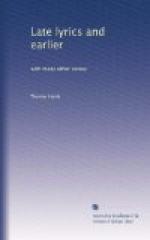Francois Hippolite Barthelemon, first-fiddler at Vauxhall Gardens, composed what was probably the most popular morning hymn-tune ever written. It was formerly sung, full-voiced, every Sunday in most churches, to Bishop Ken’s words, but is now seldom heard.
He said: “Awake my soul, and with the
sun,” . . .
And paused upon the bridge, his eyes due east,
Where was emerging like a full-robed priest
The irradiate globe that vouched the dark as done.
It lit his face—the weary face of one
Who in the adjacent gardens charged his string,
Nightly, with many a tuneful tender thing,
Till stars were weak, and dancing hours outrun.
And then were threads of matin music spun
In trial tones as he pursued his way:
“This is a morn,” he murmured, “well
begun:
This strain to Ken will count when I am clay!”
And count it did; till, caught by echoing lyres,
It spread to galleried naves and mighty quires.
“I SOMETIMES THINK” (FOR F. E. H.)
I sometimes think as here I sit
Of things I have done,
Which seemed in doing not unfit
To face the sun:
Yet never a soul has paused a whit
On such—not one.
There was that eager strenuous press
To sow good seed;
There was that saving from distress
In the nick of need;
There were those words in the wilderness:
Who cared to heed?
Yet can this be full true, or no?
For one did care,
And, spiriting into my house, to, fro,
Like wind on the stair,
Cares still, heeds all, and will, even though
I may despair.
JEZREEL ON ITS SEIZURE BY THE ENGLISH UNDER ALLENBY, SEPTEMBER 1918
Did they catch as it were in a Vision at shut of the
day—
When their cavalry smote through the ancient Esdraelon
Plain,
And they crossed where the Tishbite stood forth in
his enemy’s way—
His gaunt mournful Shade as he bade the King haste
off amain?
On war-men at this end of time—even on
Englishmen’s eyes—
Who slay with their arms of new might in that long-ago
place,
Flashed he who drove furiously? . . . Ah, did
the phantom arise
Of that queen, of that proud Tyrian woman who painted
her face?
Faintly marked they the words “Throw her down!” rise from Night eerily, Spectre-spots of the blood of her body on some rotten wall? And the thin note of pity that came: “A King’s daughter is she,” As they passed where she trodden was once by the chargers’ footfall?
Could such be the hauntings of men of to-day, at the cease Of pursuit, at the dusk-hour, ere slumber their senses could seal? Enghosted seers, kings—one on horseback who asked “Is it peace?” . . . Yea, strange things and spectral may men have beheld in Jezreel!
September 24, 1918.




